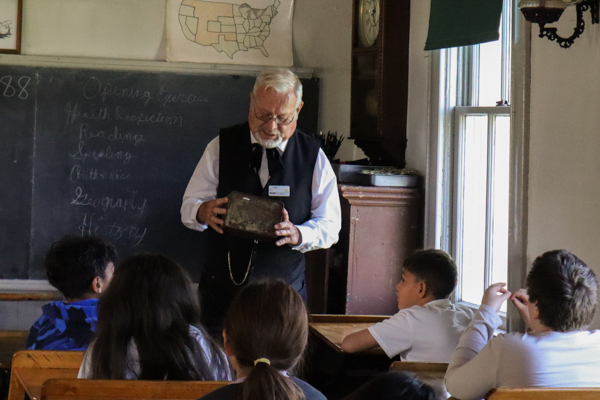
Structured Classes
Immersive field trip experiences For Grades K-8
Our structured classes feature experiences that you can’t get from a textbook – washing laundry on a washboard, putting up a tipi, pulling a hand cart across the prairie, and so much more! Structured classes are the most-requested type of field trip at Stuhr Museum and range in length and topic, each designed with Nebraska’s state educational standards in mind. Class descriptions are available below, along with the dates each class is offered, fees, and other information to help you plan a field trip experience for your students. If you have any questions, please reach out to us at education@stuhrmuseum.org or call (308) 385-5316.
Please note, Pawnee Children (grades 1-2) and Great Plains Pawnee (grades 4-5) are unavailable for the 2024-2025 school year due to the ongoing reconstruction of the earth lodge. We are excited for their return in the 2025-2026 school year, complete with new curriculum!
1-Hour Classes • 2-Hour ClasseS • 5-Hour Classes
How to schedule a class
Classes must be requested at least two weeks prior to your visit to ensure staffing is available, however, we recommend registering as early as possible for the best selection of dates and times. There are two ways to register:
Register your school online. You’ll need to have your school’s basic information to fill out the form, as well as:
- The title of the desired class
- Number of students
- Number of school staff and chaperones you intend to bring (please note, Stuhr Museum memberships do not cover field trip fees)
- Possible dates to attend
If you start the registration process and find that you’re missing a piece of information, you can save your progress and e-mail yourself a link to finish it later. After your registration information is received, our scheduler will review the information and reach out to you to confirm the date of your visit.
Go to online REGISTRATION form
OR Call us on the phone at (308) 385-5316. You will need to have the same information as listed above to complete your registration.
If you register your school over the summer, you can expect your school’s 2024-2025 field trip schedule to be sent in late July/early August. Registrations will be processed in the order received, so we recommend registering early with your preferred field trip dates!
Class Size
The minimum number to schedule a class is 10 students. If your school or homeschool group contains fewer than 10 students, your group will be combined with another small group.
The maximum number of students varies by class, which can be found with each class description.
Parent/Guardian Chaperones
Public/Private Schools: Parent chaperones are not required to attend structured classes; however, if your school chooses to bring chaperones, we require no more than 1 adult per 5 students attend with your class. (This ratio does not include any school staff needed for 1:1 student assistance.) In order to provide a safe learning environment for students, Stuhr Museum requires that a list of chaperone names be submitted at least 2 days prior to your visit. Only chaperones listed by the school will be permitted to attend the class with students. Chaperones are charged the same rate as students for the class. Please note, Stuhr Museum memberships do not cover field trip fees and chaperones are not allowed to bring additional children to the class, i.e. younger siblings. If chaperones become a distraction or bring additional children to the class, they may be asked to leave at any time at the discretion of the Museum Educator.
Home School Co-Op Groups: Chaperones are not required to attend structured classes; however, if your co-op chooses to bring chaperones, we require no more than 1 adult per 5 students attend with your group. If your Homeschool group chooses to bring additional chaperones, you may not exceed the ratio of 1 chaperone per 5 students. For Homeschool Co-Op Groups, a ratio of 1 adult per 20 students will be used to determine how many adults will be considered for free/reduced school staff pricing (1 adult per 20 students, 2 adults per 40 students, 3 adults per 60 students, etc.) All other adults will fall into the 1:5 chaperone ratio and are charged the same rate as students. In order to provide a safe learning environment for students, Stuhr Museum requires that a list of chaperone names be submitted at least 2 days prior to your visit. Only chaperones listed by the school will be permitted to attend the class with students. Chaperones are charged the same rate as students for the class. Please note, Stuhr Museum memberships do not cover field trip fees and chaperones are not allowed to bring additional children to the class, i.e. younger siblings. If chaperones become a distraction or bring additional children to the class, they may be asked to leave at any time at the discretion of the Museum Educator.
Single Home School Families: Structured classes do not require parent/adult chaperones to attend however, if you choose to stay with your child’s class you will be charged as a chaperone. Chaperones are charged the same rate as students. If you wish to drop your student off at their class and leave the museum, there will be no charge. Please note, Stuhr Museum memberships do not cover field trip fees and chaperones are not allowed to bring additional children to the class. If chaperones become a distraction or bring additional children to the class, they may be asked to leave at any time at the discretion of the Museum Educator.
Payment
Schools: When you submit your registration, we will ask you how you wish to pay. If you prefer to be invoiced, you will need to provide either a mailing address or e-mail address for the person who should receive your school’s invoices. On the day of your visit, we will collect a final headcount to be used for invoicing. If you prefer to pay on the day of your class, payment by credit card or check can be accepted. Checks must be made out in the correct amount, as we are not able to refund for missing students on the day of your visit. Schools can choose to have their parent chaperones pay their own fee the day of class, or those fees can also be added to your invoice. Please note, Stuhr Museum memberships do not cover class fees.
Homeschools: Class fees for students and chaperones may be paid for on the day of your visit at the Gate House when you arrive. Please note, Stuhr Museum memberships do not cover class fees for students or adults and additional children are not permitted to attend classes.
Scholarships
The Ella Epp Fund Matching Scholarship is available for Class C, D and Title I schools. It provides assistance in attending structured classes at Stuhr Museum. Schools must be nominated to receive funding. To nominate a classroom or for more information, click here.
1-Hour Classes
9:00-10:00 a.m. • 10:30-11:30 a.m.
12:30-1:30 p.m. • 1:45-2:45 p.m.
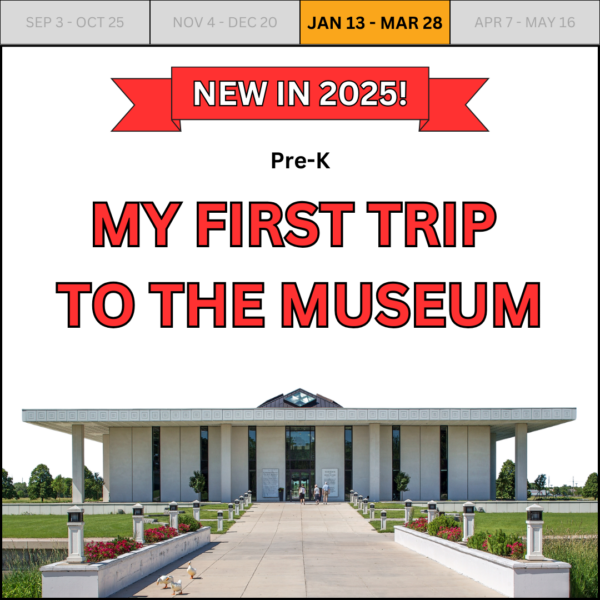
NEW! My First Trip to the Museum • Available January 13 – March 28, 2025 • $8.00 per Person
Come visit Stuhr Museum and learn all about what a museum does, specifically a history museum! Learn how a museum keeps its artifacts safe and how they use them to make the exhibits you see inside the buildings! Students will follow a story as they learn about the artifacts and exhibits upstairs, with plenty of time for questions from our youngest visitors!
The maximum capacity for this class is 1 group of up to 25 students per class time. Maximum 1 adult per 5 students. No charge for school staff.
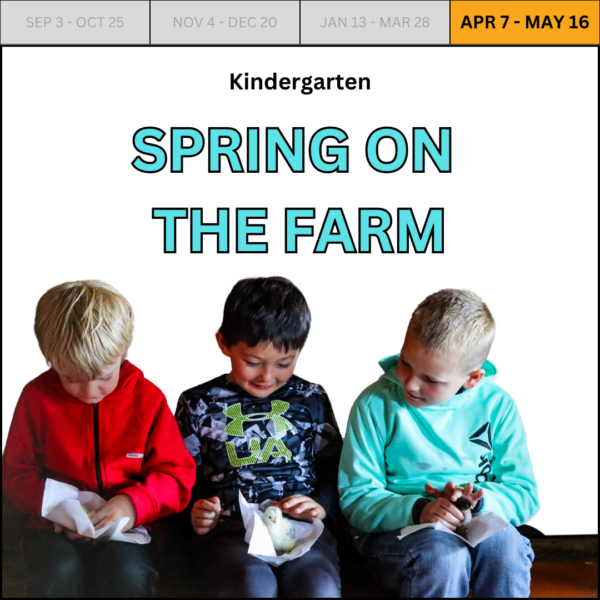
SPRING ON THE FARM • Available April 7 – May 16, 2025 • $8.00 per Person
On a farm in the 1880s, everyone was expected to pitch in and help with chores, and there were no exceptions for young children! You will visit the barn and meet some animal friends while learning about the various animals a farm might have had, including goats and sheep, and how these animals were used. You will also visit the chicken coop to see and talk about chickens, with a chance to hold a baby chick. Other farm chores will also be explored, including pumping water and the importance of the farm bell.
The maximum capacity for this class is 2 groups of up to 25 students (50 total) per class time. Maximum 1 adult per 5 students. No charge for school staff.
2-Hour Classes
9:00-11:00 a.m. • 12:30-2:30 p.m.
Other times may be available upon request
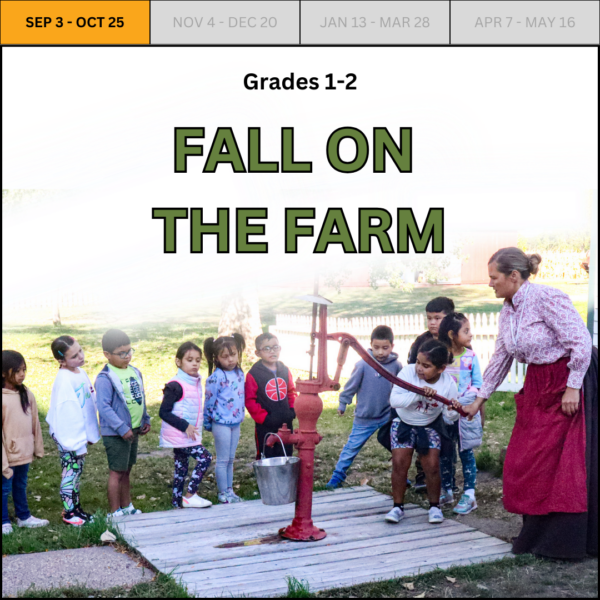
Fall ON THE FARM • Available SEPTEMBER 3 – October 25, 2024 • $8.00 per Person
Come learn about the daily fall chores on a farm that everyone in a farm family on the Nebraska plains in the 19th century would have pitched in to do. You will visit the barn, windmill, chicken coop, granary, and garden, stopping to learn about the chores to be done at each location. You will help pump and haul water; wash clothes using a scrub board and hang them on a line. But the work isn’t done yet! You will also help shell, grind, and sift corn that could be used in baking.
The maximum capacity for this class is 2 groups of up to 25 students (50 total) per class time. Maximum 1 adult per 5 students. No charge for school staff.
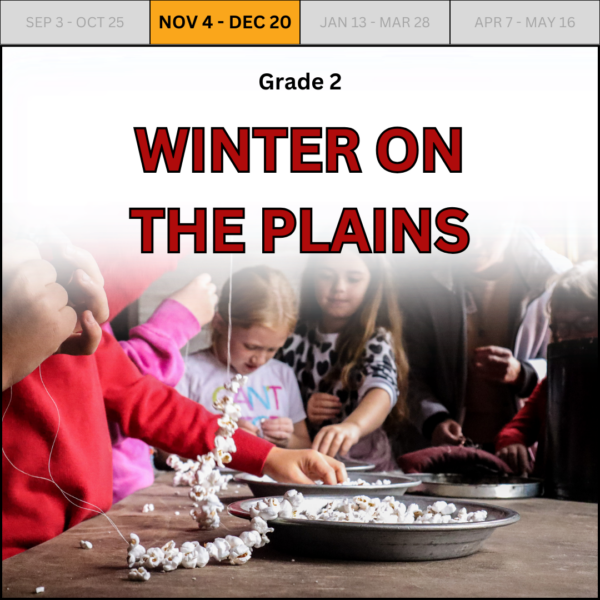
Winter on the Plains • Available November 4 – December 20, 2024 • $8.00 per Person
It’s Winter on the Plains of Nebraska! Experience what winter life for families on Nebraska’s plains in the 19th century was like. You will learn about and help with some chores around the house, and will even get a peek into some special gifts given in the era while learning about holiday celebrations. Class locations include the 1850s Vieregg Cabin, the 1880s Hired Man’s House, the 1890s Peter Stuhr House, and the 1900s Cleary Farmhouse, each offering a unique peek into history. Groups are welcome to request a specific site at registration, but hurry- this popular class fills up quickly!
The maximum capacity for this class is 4 groups of up to 25 students (100 total) per class time. Maximum 1 adult per 5 students. No charge for school staff.
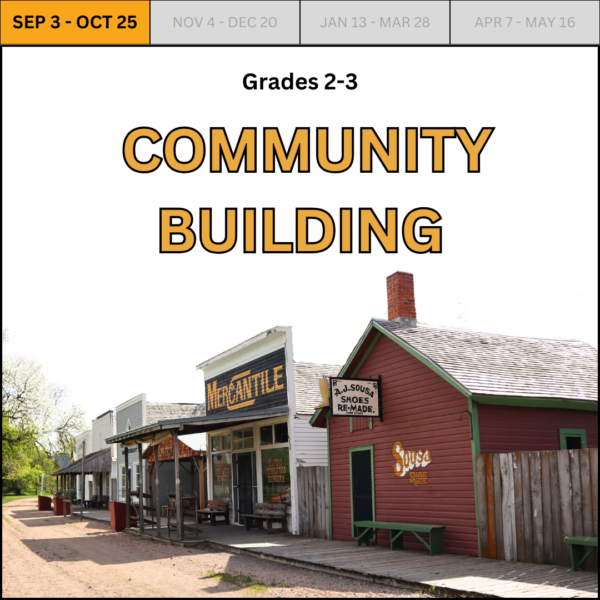
Community Building • Available September 3 – October 25, 2024 • $8.00 per Person
What makes a productive and successful community? Go back in time and examine the diverse communities of Native Americans, early plains settlers, and booming railroad towns. Learn how local government and laws within the communities, impact the lives of citizens. Financial considerations such as bartering, trading, marketing of goods, and taxation will be explored. Community patterns such as land use, roads, etc., will be studied. Hands-on activities will include mapping towns and communities, role-playing community members, and decision-making as a community.
The maximum capacity for this class is 1 group of up to 25 students per class time. Maximum 1 adult per 5 students, please. No charge for school staff.
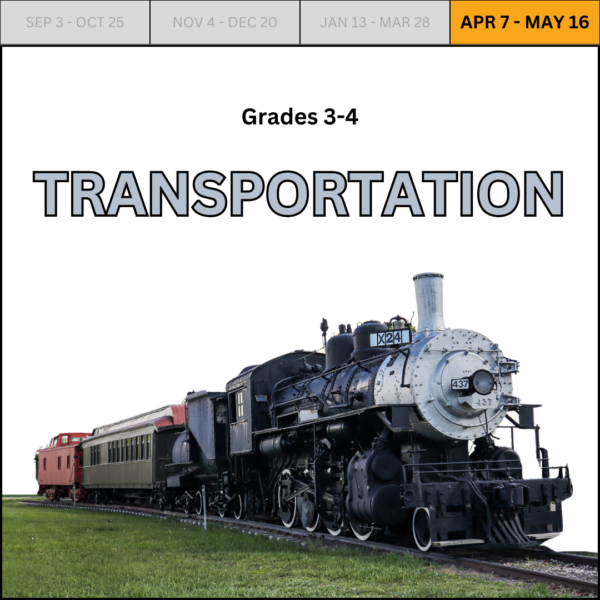
Transportation • Available April 7 – May 16, 2025 • $8.00 per Person
Learn all about the types of transportation used through the 19th century. You will visit the Gus Fonner Memorial Rotunda where you will discover how the harness and the ox yoke were used to connect the horse or the ox to plows or wagons. In Railroad Town, you will get the opportunity to make real-world connections between various wagons in the livery stable and the modern versions we have today. Next, you will discuss steam power with a visit to the rail yards in Railroad Town. The jobs of railroad employees, including the Station Master, Engineer, Fireman, Conductor, and Brakeman are examined as the Depot, and the Caboose are all explored.
The maximum capacity for this class is 2 groups of up to 25 students (50 total) per class time. Maximum 1 adult per 5 students. No charge for school staff.
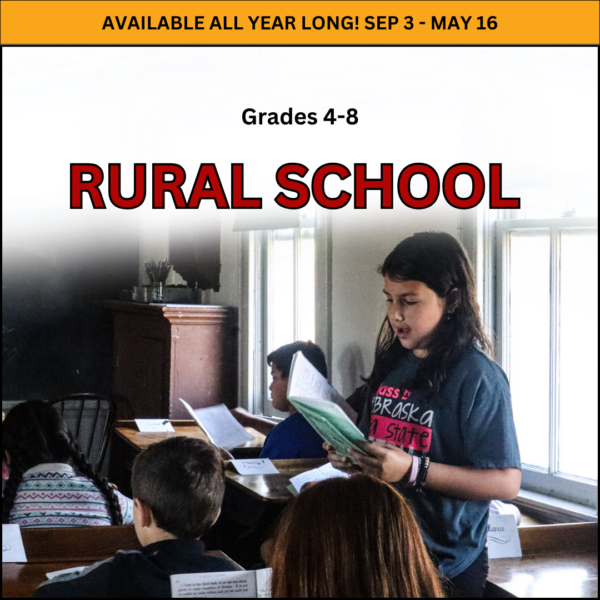
Rural School • Available September 3, 2024 – May 16, 2025 • $8.00 per Person
Just like students in the 1880’s, you too will start your day by raising the flag just outside the schoolhouse. Next, you will move into the cloakroom, where daily procedures are discussed and a few period items viewed. It’s time to take your seat! Once seated at your desk, you will learn general information about the life of 1880s Nebraska students and teachers. Now it’s time to time travel! The remainder of the class is taught in the first person as if you were actually attending school in 1888. You will study reading and arithmetic using reproduction textbooks and chalk slates, penmanship using nib pens and ink, geography viewing an 1888 reproduction map, history using pictures and paintings in the room, and participate in a spelling bee. The class ends with the final bell, signaling a resumption of modern life, with just enough time for questions and answers.
The maximum capacity for this class is 1 group of up to 25 students per class time. Maximum 1 adult per 5 students, please. No charge for school staff.

Log Cabin Life • Available September 3 – October 25, 2024 • $8.00 per Person
Experience what life was like for someone living on the Nebraska Prairie in a log cabin. Learn about how log cabins were constructed and hear the stories of the people who originally lived in the log cabin you will be exploring. Through hands-on activities, you will get to make biscuits, churn butter, wash dishes, taste test your biscuits and butter, and make rope.
The maximum capacity for this class is 1 group of up to 25 students per class time. Maximum 1 adult per 5 students, please. No charge for school staff.

Science, Technology, And Trades • Available September 3 – October 25, 2024 OR April 7 – May 16, 2025 • $8.00 per Person
Technology in the 19th century? You will learn how science and technology in the late 19th century affected the daily lives of those who worked in communities on the plains. The focus of this class will be on the science and technology related to community business and trades, with an emphasis on communication, transportation, and power. You will experience how science and technology helped communities and businesses through several hands-on opportunities including printmaking and morse code communication.
The maximum capacity for this class is 1 group of up to 25 students per class time. Maximum 1 adult per 5 students, please. No charge for school staff.
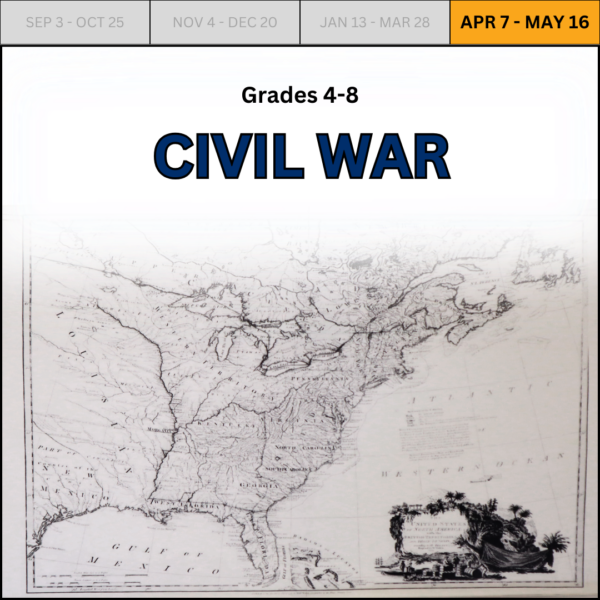
Civil War • Available April 7 – May 16, 2025 • $8.00 per Person
In 1861, the United States was torn apart by the American Civil War, and the impacts were felt by everyone. During your class time, you will be diving into four hands-on, activity stations to investigate how the Civil War impacted women, children, soldiers, and the Nebraska Territory as a whole. Each of the four stations will consist of a short reading and a hands-on activity linked to the material culture of the time period, in relation to the main topic of the station. Music, literature, customs, and more will be the cross-curricular ties that help piece together how the Civil War impacted everyone regardless of who you were or which part of the current-day United States you lived in.
The maximum capacity for this class is 1 group of up to 25 students per class time. Maximum 1 adult per 5 students, please. No charge for school staff.
.
5-Hour Classes
9:30 a.m. - 2:30 p.m.
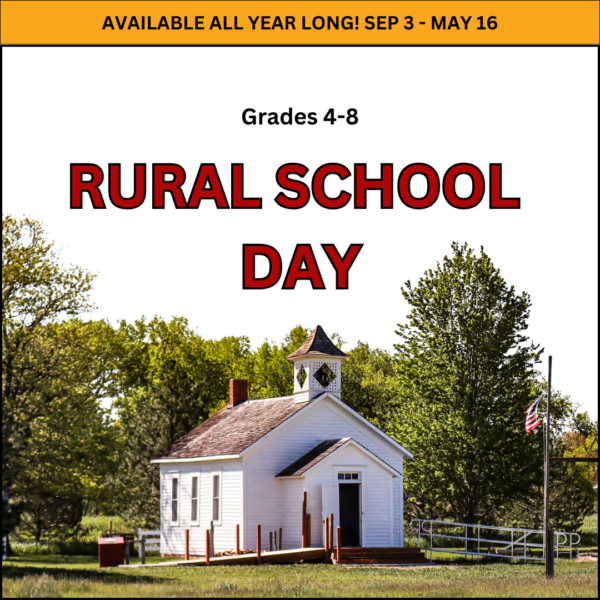
Rural School Day • Available September 3, 2024 – May 16, 2025 • $12.00 per Person
This class takes place at the Rural School and expands considerably on the two-hour Rural School class. During a full-day session, you will be able to get a more in-depth experience with each subject taught during a typical 1888 school day. Now it’s time to time travel! The remainder of the class is taught in the first person as if you were actually attending school in 1888. You will study reading and arithmetic using reproduction textbooks and chalk slates, penmanship using nib pens and ink, geography viewing an 1888 reproduction map, history using pictures and paintings in the room, participate in a spelling bee, and more. You are encouraged to bring a period-appropriate lunch for noon. The day includes two recess periods where you will experience popular period games. Class ends with the final bell, signaling a resumption of modern life, with just enough time for questions and answers.
The maximum capacity for this class is 1 group of up to 25 students per class time. Maximum 1 adult per 5 students, please. No charge for school staff.
+ Period School Lunch Information
+ Downloadable Handwriting Practice Sheet
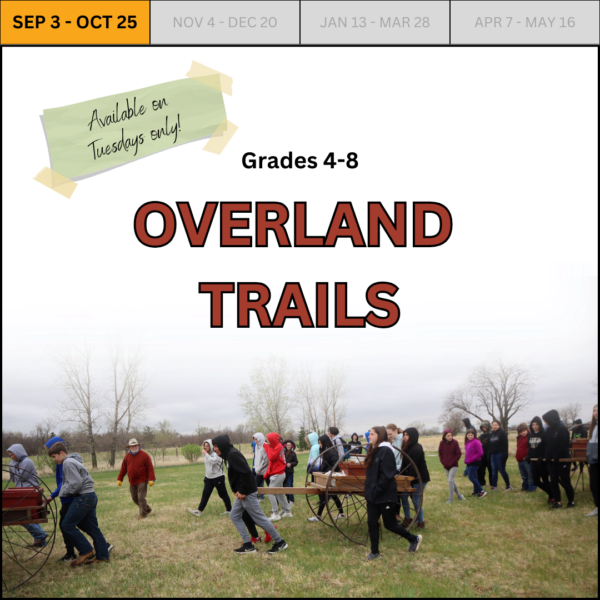
Overland Trails • Available Tuesdays: September 3 – October 25, 2024 • $15.00 per Person
Kick off the school year with the adventure of a lifetime – traveling the trails! You will start the day learning about the Overland Trails and the reasons behind the Great Migration, then pack up your own hand carts and hit the trails. Teamwork and communication will be key on the journey, and you will learn about the hardships faced by the early travelers of the trails through firsthand journal readings. Midday there will be a meal prepared over an open fire that you help with. This is also a time for you to rest and reflect before finishing the long journey. Weather-appropriate, layered clothing and closed-toed shoes are required. Long pants are suggested.
The maximum capacity for this class is up to 40 students per class time. Maximum 1 adult per 5 students. School staff will receive a discounted rate of $12.00.
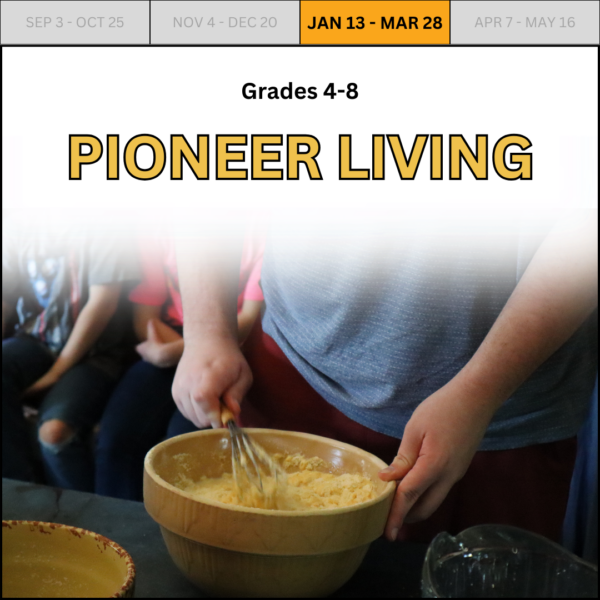
Pioneer LIving • Available January 13 – March 28, 2025 • $15.00 per Person
Class locations include the 1850s Vieregg Cabin, the 1880s Hired Man’s House, the 1890s Peter Stuhr House, and the 1900s Cleary Farmhouse. Each location offers a very unique experience. Class begins with a quick tour of the “out-houses” and their various uses. Once inside, work begins on the preparation of the noon meal, with everyone helping to prepare a stew, corn gems, churn butter, and corn cob jelly, using a wood cookstove and other tools of the period. After dinner, there are many chores to do and you will focus on the daily chores that were necessary for survival on the plains, and each person’s responsibilities to the family and established community, with an opportunity to compare this with life today.
The maximum capacity for this class is 4 groups of 10-12 students per class time. We request 1-2 adults per group/site. School staff will receive a discounted rate of $12.00.
